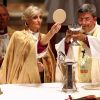
Women Bishops: every cloud...
The decision by the General Synod to reject women bishops has left the Church of England in crisis.
On one side are the great and good of England’s established Church. The Bishop of Exeter, the Rt Rev Michael Langrish, was “strongly” in favour of women being appointed as bishops.
The Bishop states that "Many, right across the Church of England will be feeling stunned. The mood among all Synod members is subdued.”
"The rejection of the measure to enable women to be ordained as bishops will be a cause of disappointment, anxiety and even anger among those who have campaigned hard for this development, and believe it to be of crucial importance for the effective ministry of the church in the service of the Gospel.”
The Bishop went on to agree with the Archbishop of Canterbury, Dr Rowan Williams, that the Church of England was in danger of losing its credibility and "had a lot of explaining to do".
But before we all get the idea that this was all just some kind of administrative error, there was clearly significant opposition from within the Church to equality and change on Biblical grounds. The Rev Prebendary Rod Thomas, vicar of St Matthews in Elburton, Plymouth, and chairman of the conservative evangelical grouping Reform, said the church had "avoided making a big mistake which would have led to real division".
Nevertheless, Exeter’s Bishop is probably right in seeing the defeat of legislation introducing the first women bishops as "a tragedy". But, a tragedy for whom?
What the rejection of women bishops may have done is to highlight that the Church of England as an arm of the state is unsustainable in a modern society.
As a result of the vote, it’s now not just the usual suspects that are saying the time is over for an established church with a right to have its (male) representatives in the House of Lords. Conservative MP and Church Commissioner Sir Tony Baldry has said that the decision makes the Church of England look like "a sect", while Tory backbencher Eleanor Laing argues that the Church's "position as the established church must be called into question".
Tony Baldry has also pointed out that the Church has damaged its chances of resisting government plans for gay marriage. Church members would be “deluding themselves” if they thought their views on “moral issues such as same-sex marriage” would be given the same weight as before.
‘Moderate’ mainstream Christianity is declining and evangelical faith, even within the Church of England, is becoming more evident. The potential conflicts between religion and liberal society are many: homosexuality; abortion; relationships outside of marriage; safe sex; contraception; drug use and harm reduction; adoption; education; equality and diversity; scientific research; divorce; end of life; gender equality; etc.
In effect, society and religion are diverging and polarising, and we likely see more examples of how the Church is losing touch with modern Britain.





















